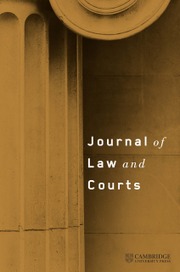No CrossRef data available.
Article contents
Assessing the Credibility of Constitutional Experts
Published online by Cambridge University Press: 01 December 2022
Abstract
This study investigates how citizens assess the credibility of constitutional experts on matters of government authority. Analyses of data from two similarly designed experiments, conducted with national samples, reveal that partisanship, race, and level of education are significant predictors of survey respondents’ willingness to extend credibility to constitutional experts. The compatibility of the views expressed by experts with respondents’ own policy views on issues that are the subject of proposed government action is also important. Evidence shows that this consistency is more important in the decision that experts are credible than in decisions that they are not credible, suggesting that esteem motives are relevant in the decision to credit experts who express views congenial to our own that are distinct from social-identity motives scholars have theorized to be important in partisan resistance to expertise. The implications of findings for holding government officials accountable to constitutional limits on government authority are considered.
- Type
- Research Article
- Information
- Copyright
- © The Author(s), 2022. Published by Cambridge University Press on behalf of the Law and Courts Organized Section of the American Political Science Association




